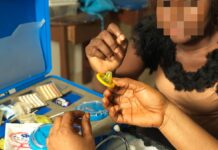What is basic life support?
Basic life support (BLS) refers to a range of life-saving procedures that are performed in an emergency so as to help the affected individual to survive.
What are the procedures that make up BLS?
It consists of cardiopulmonary resuscitation (CPR), defibrillation with automated external defibrillators (AEDs), basic first aid, controlling bleeding, immobilising the spine and stabilising fractures.
Certain guidelines are usually followed when giving basic life support. These guidelines are based on the mnemonic – CAB – which stands for: Circulation – Airways – Breathing (CAB).
- Circulation: An important part of BLS is to ensure that circulation is normal, and blood is moving to the body’s tissues and vital organs. This is because blood carries oxygen and nutrients which the tissues and organs need to function well.
- Airway: It is also essential to make sure that the airways are not blocked. And involves inserting and setting up artificial airways if needed.
- Breathing: Ensures that the individual is breathing – makes sure that the airways and lungs carry oxygen and carbon dioxide in and out of the body, as they should.
When should BLS be given?
BLS is the emergency treatment given after a person has had a cardiac arrest (heart attack), or a respiratory arrest; it provides external support for his/her heart and breathing. It is also given to persons with life-threatening injuries (like choking, drowning, hypothermia).
It is important to administer basic life support early so as to increase the chances of survival. Although BLS does not provide all the immediate health needs of the affected individual, it improves his/her chances of survival until fuller, more expert health care can be provided.
Who should administer BLS?
Basic life support is usually provided by:
- EMT (emergency medical technicians),
- Trained initial/first responders,
- Paramedics,
- Doctors,
- Nurses,
- Police officers,
- Teachers,
- Life guards,
- Daycare providers,
- Security guards,
- Athletic trainers,
- Firemen, and
- Social workers.
These hold strategic positions that could be labelled “professional rescuers”; and so it is important that they be trained to administer basic life support as the skills may be required at any time. Medical professionals should also, without a doubt, have this skill; they are also trained in more advanced and specialised forms of life support (for instance, Advanced Cardiac Life Support).
When should BLS be stopped/terminated?
- When the individual can be given more specific, adequate and advanced medical care;
- When the individual starts to breathe on his/her own; or
- When his/her heart begins functioning normally on its own.









